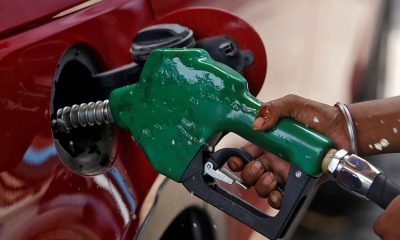Business
More marketers approach banks for loans to import fuel
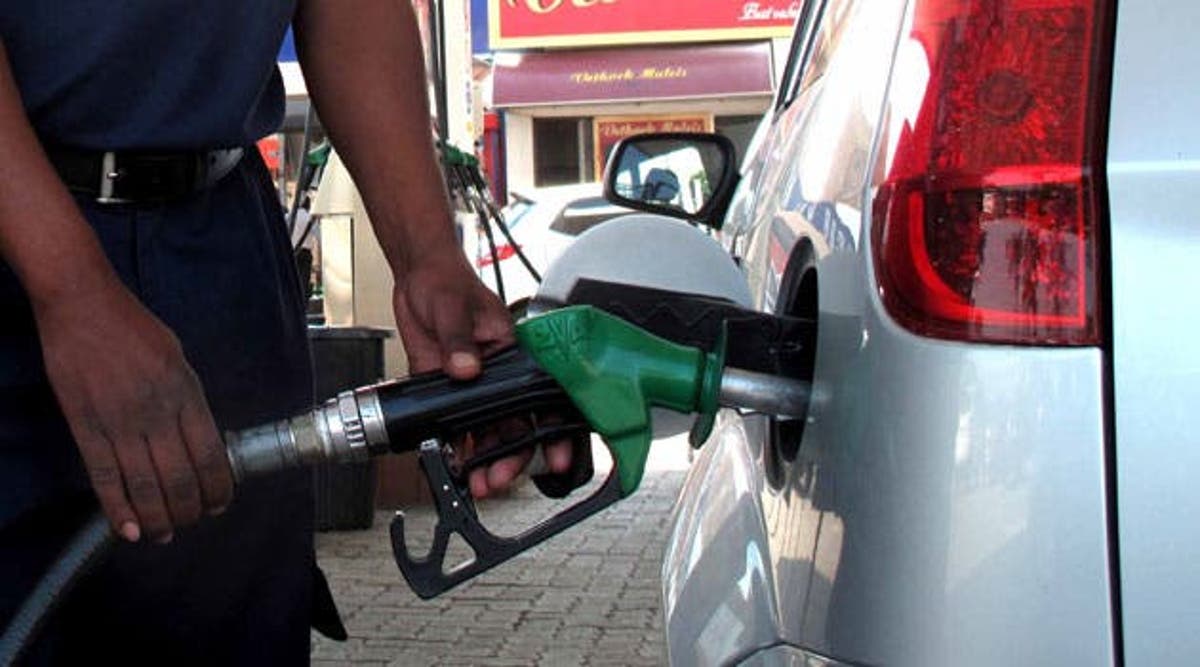
More marketers approach banks for loans to import fuel
Banks are set to increase funding of petrol importation to the N3.5 trillion as more marketers move to import the product amidst push for exclusivity of local production and supply led by Dangote Refinery.
Financial Vanguard learnt that banks are now receiving more loan requests for funding petroleum products imports with the head of oil and gas in a tier-1 bank saying about N250 billion single request came to his desk last week, the third in the last one month.
He estimated the banking industry funding of petrol imports to be around N3.5 trillion before end of this year.
He stated: “We have started seeing a lot of petroleum marketers coming up with loan requests for importation of products, which we didn’t have before now not even when the President declared that subsidy is gone.
“We have also done our due diligence on the market and discovered that deregulation is gaining traction across the private and public sectors.
“Before now we do not entertain lending to petrol marketers due to issues around pump price regulations because many banks had burnt their fingers in the recent years over oil and gas related loans that failed.”
Petrol costlier than actual market price, NLC alleges
Meanwhile the Nigeria Labour Congress, NLC, has alleged that the pump price of petrol is higher than market price, accusing marketers of ripping off Nigerians.
READ ALSO:
- Afenifere, Council of Obas back Aiyedatiwa for Ondo gov
- ICPC to probe INEC officials alleged fraud in Edo election
- 16 children, 30 other Palestinians killed during Israeli attacks on Gaza
NLC in a communiqué at the of its National Executive Council, NEC, in Port Harcourt Rivers State, by its President, Joe Ajaero, noted with “increasing dismay the shenanigans around the appropriate pricing of petrol, (Premium Motor Spirit, PMS) in Nigeria.”
NLC observed that there may be a gangup against Nigerians by fat cats in the industry as the current price of the product is significantly higher than the real market price. Padding of costs and abnormal margins seems to be the order of the day considering the revelations from the ongoing controversy between Marketers and Dangote group. It is entirely possible that Nigerian workers and masses are being ripped off by those who control the levers of Economic power in Nigeria which explains why the domestic public refineries may not immediately be allowed to come on stream.
“How can one explain the situation where marketers are still eager to import petrol with all the taxes such are import charges, fright charges, Nigerian Port Authority, NPA, Nigerian Nigerian Maritime Administration and Safety Agency, NIMASA, among others, despite a local source of refined petroleum products speaks volume.
“NLC demands appropriate pricing of petrol and calls for the Public domestic refineries in PH, Warri and Kaduna to quickly come back on stream to break-up the monopolistic stranglehold the big players have on the industry.”
At $72 per barrel of oil, imported petrol should be cheaper in Nigeria — Experts
Supporting NLC’s position, experts and other stakeholders, weekend, said at the current price of $72 per barrel of crude oil, the price of Premium Motor Spirit, PMS, also known as petrol, should be cheaper in Nigeria.
They said the current price of N1, 025 per litre (Lagos) was taken when crude oil, a major feedstock stood at more than $80 per barrel in the global market September 2024.
Since then, they said the price of crude has been volatile before dropping to the current $72 per barrel, without reflecting in the domestic price of petrol.
In different interviews with Vanguard, the experts noted that deregulation as currently practiced should enable the market to respond seamlessly to changes, including crude oil, the major raw material.
On his part, a Port Harcourt-based energy analyst, Dr. Bala Zakki, said: “The irresponsible petroleum products price dynamics in Nigeria is never obtainable in any Organisation of Petroleum Exporting Countries, OPEC member nations and the reason is very simple and straightforward.
“OPEC member nations have their functional state-owned refineries. No responsible government will or should abdicate its responsibilities of providing goods & service to the private sector.
“Globally, private sector operators are known to be shylocks, exploitative and profit maximizers.”
More marketers approach banks for loans to import fuel
Vanguard
Business
Updated: NNPC debunks claims Port Harcourt refinery trucking-out old product

Updated: NNPC debunks claims Port Harcourt refinery trucking-out old product
The Nigerian National Petroleum Company (NNPC) Limited has denied claims by a community leader in Alesa, Rivers State, alleging that the Port Harcourt refinery is not yet producing fuel.
In a statement released on Friday, NNPC spokesperson Olufemi Soneye criticized the comment made by the community leader, it was based on ignorance about refinery operations.
Soneye explained that while he would have typically ignored such remarks, he felt compelled to respond in order to clarify the situation.
Timothy Mgbere, a leader in the Alesa community, appeared on national television on Thursday, where he accused the NNPCL of misleading Nigerians by claiming that the Port Harcourt refinery was already processing crude oil.
READ ALSO:
- Many dead as boat carrying 200 people capsizes in Niger State
- Container from truck falls on couple’s car in Oyo
- No child should go to bed hungry, Tinubu seeks French investment in Nigeria’s food security
But Soneye said the Port Harcourt refinery was currently operating at 90% capacity.
He emphasized that the allegations lacked merit and were inconsistent with the facts.
The NNPC spokesperson noted that the community leader had acknowledged fuel being loaded out from the refinery’s gantry but dismissed it as “old stock” from the previous refinery, which, Soneye argued, further undermined the credibility of the allegations.
“He (Mgbere) claimed that the old Port Harcourt Refinery was only operating skeletally and was not processing PMS. His proof was that the PMS truck-out was done at the gantry of the new Port Harcourt Refinery as against the gantry of the old Port Harcourt Refinery.
“This betrays his scant knowledge of the operations of the refinery. The old and new Port Harcourt refineries have since been integrated with one single terminal for product load-out.
“They share common utilities like power and storage tanks. This means that storage tanks and loading gantry which he claimed belong to the new Port-Harcourt Refinery can also receive products from the Old Port Harcourt Refinery
“The nameplate capacity of the refinery is 60,000 barrels of oil per day. It is currently producing at 90 per cent throughput which translates to Straight-Run gasoline (Naphtha) blended into 1.4 million liters of PMS, aside from other products like diesel and kerosene.
“We call on the general public to disregard the claims of the self-acclaimed ‘community person’ which are obviously borne out of sheer mischief and blatant display of ignorance,” Soneye said.
Port Harcourt refinery now 90% operational, says NNPC, tackles community leader claim
Railway
FG hands over $3bn Port Harcourt-Aba railway project to NRC
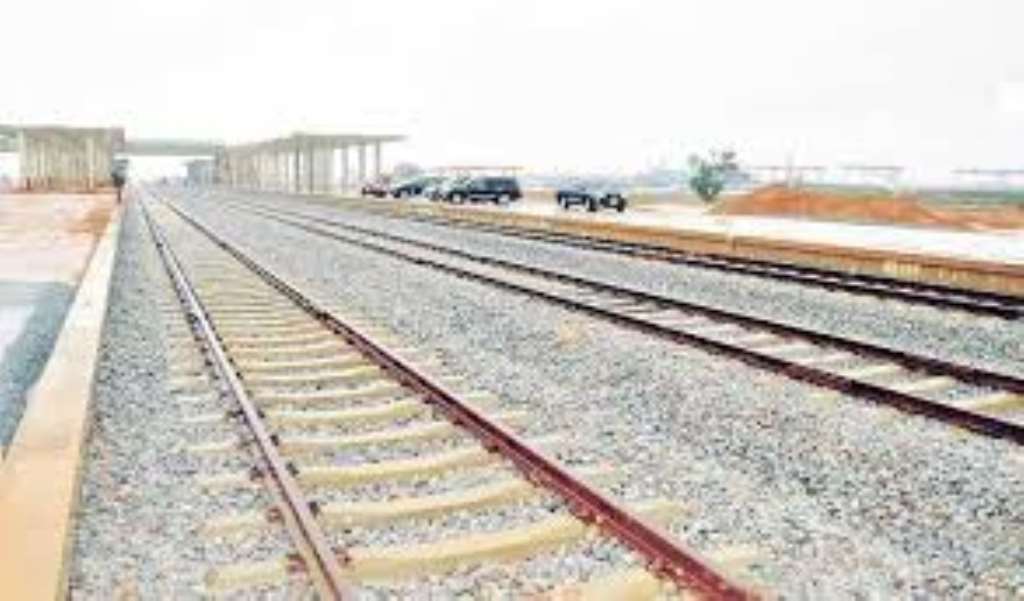
FG hands over $3bn Port Harcourt-Aba railway project to NRC
The 62-kilometre, $3.02 billion Port Harcourt-Aba railway project has been completed by Federal Government and handed over to the Nigerian Railway Corporation (NRC).
The Port Harcourt-Aba section is part of the larger Port Harcourt-Maiduguri eastern narrow gauge railway project, initiated under the administration of President Muhammadu Buhari.
The project supervisor, Federal Ministry of Transportation, Ayo Dada, formally transferred the railway to the NRC during a brief ceremony held on Thursday in Port Harcourt.
He said that the project, completed in May, had significantly improved passenger movement between Rivers and Abia, thereby enhancing their economies.
“The assets handed over include dismantled tracks measuring 283.060 km, rehabilitated and reconstructed 62.800 km of subgrade and the laying of 62.800 km of rail for the main line,” Dada said.
“This includes the laying of rail for sliding lines covering 5.690 km and the reconstruction of 27 sets of turnouts at Port Harcourt, Elelenwo, Obuzor, Umugo and Aba Stations, among others.”
Dada said that with the handover of the Port Harcourt–Aba section, the Federal Government would focus on the Port Harcourt–Maiduguri phase of the project.
READ ALSO:
- Naira appreciates to N1,740/$ in parallel market
- Reform Bills propose 55 per cent VAT revenue for states
- Nigeria ranks 4th among Africa’s most improved visa friendly nations
“The contractor has submitted the technical specifications and maintenance manual for the Port Harcourt–Aba section to the consultants.
“The ministry is committed to completing this project, which will foster national development,” he said.
The Managing Director of the NRC, Ben Iloanusi, commended the Federal Government and the ministry of transportation for the timely completion and transfer of the project.
Iloanusi, represented by the NRC Deputy Manager (Civil), Adesegun Ogunade, said that the railway had greatly benefited Nigerians seeking affordable transportation options.
“The rail line, now in operation, has started mitigating the impact of high transportation costs caused by economic challenges,” he said.
“Train services have been running for some time and passengers have reported that it has made commuting between Port Harcourt and Aba more convenient, faster and cheaper.
“People are already experiencing the benefits of this government’s policies and programmes.’’
He assured that the Port Harcourt–Maiduguri section would also be completed in due course, emphasising that adequate security arrangements had been made to ensure the safety of workers and passengers.
FG hands over $3bn Port Harcourt-Aba railway project to NRC
Business
Naira appreciates to N1,740/$ in parallel market

Naira appreciates to N1,740/$ in parallel market
The Naira yesterday appreciated to N1,740 per dollar in the parallel market from N1,745 per dollar on Wednesday.
Likewise, the Naira appreciated to N1,644.86 per dollar in the Nigerian Autonomous Foreign Exchange Market, NAFEM.
Data from FMDQ showed that the indicative exchange rate for NAFEM fell to N1,644.86 per dollar from N1,660.83 per dollar on Wednesday, indicating N15.97 appreciation for the naira.
READ ALSO:
- Reform Bills propose 55 per cent VAT revenue for states
- Nigeria ranks 4th among Africa’s most improved visa friendly nations
- 2023 Hajj: NAHCON refunds N5.3b to states, tour operators
The volume of dollars traded (turnover) increased by 66 percent to $560.34 million from $337.07 million traded on Wednesday. Consequently, the margin between the parallel market and NAFEM rate widened to N95.14 per dollar from N84.17 per dollar on Wednesday.
Naira appreciates to N1,740/$ in parallel market
-

 Entertainment3 days ago
Entertainment3 days agoDavido: They want to cancel my show in Nigeria over economy comment
-
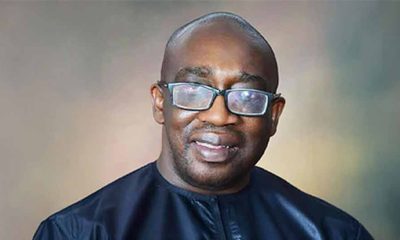
 metro3 days ago
metro3 days agoTinubu appoints Jami’u Abiola as Senior Special Assistant
-
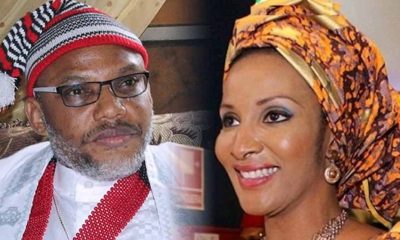
 metro3 days ago
metro3 days agoBianca raises hope Tinubu will free Nnamdi Kanu to restore peace in South-East
-
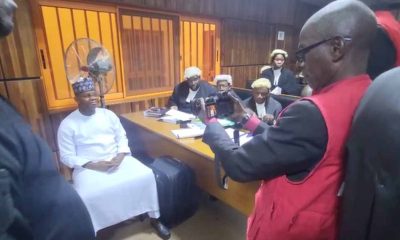
 metro3 days ago
metro3 days agoDrama as Yahaya Bello calms supporters after judge storms out of court over rowdiness
-

 metro2 days ago
metro2 days agoWhy we relocated Osun airport — Gov Adeleke
-

 News22 hours ago
News22 hours agoNo child should go to bed hungry, Tinubu seeks French investment in Nigeria’s food security
-

 metro2 days ago
metro2 days agoJUST IN: DSS arrests Kano-based activist over suspected Facebook post
-

 Business3 days ago
Business3 days agoPH refinery to blend 1.4-million litre petrol daily – NNPC







